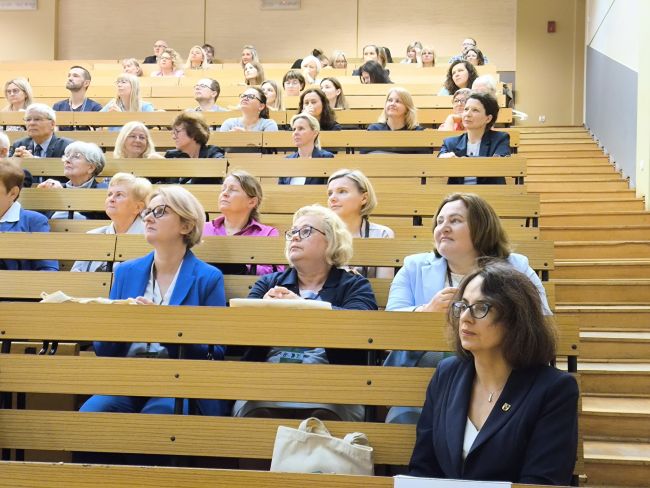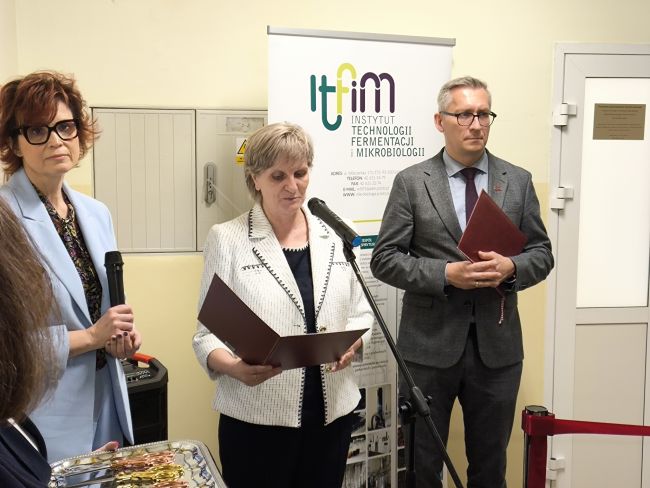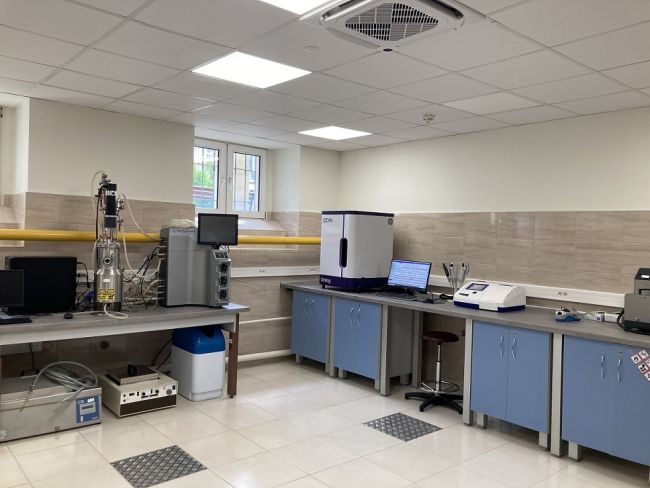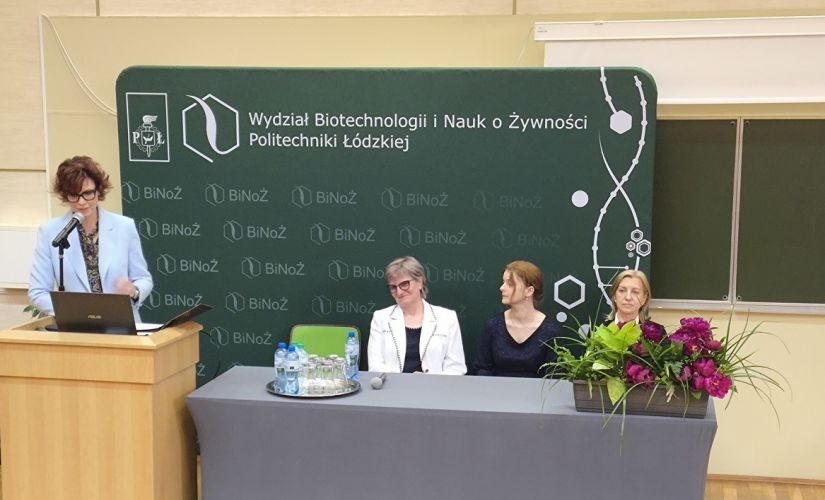75 years of innovation with the future in mind
Since 1950, the Faculty has been developing solutions that transform the Polish food and biotechnology industries.
As the first faculty in Poland to train engineers for the food sector, we built the foundations of modern biotechnology. Today, 75 years later, we not only continue this tradition—we set new directions, says the Dean of the BiNoŻ Faculty, Prof. Edyta Gendaszewska-Darmach.

Interview with Dean Prof. Edyta Gendaszewska-Darmach for local media
photo: editorial staff
The Faculty conducts research on functional food for people with allergies, the use of microorganisms for wastewater treatment, biodegradable packaging, and green technologies for industry. Importantly, the results of these studies do not end with scientific publications. They reach pharmacies, production plants, and laboratories across Poland.
Among the practical achievements are the probiotics LATOPIC and LAVIPAN, developed right here, and the biomass processing technology still used today at Polmos Żyrardów. The Faculty also hosts one of two accredited sugar assessment laboratories in the country.
The BiNoŻ Faculty employs 104 academic teachers, nearly 45% of whom are professors and habilitated doctors. The Faculty can boast 12,000 graduates, 490 promoted doctors, and 77 habilitated doctors. Currently, nearly 600 students and 30 doctoral students are being educated here.

The Faculty’s hall gathered many guests
photo: Michał Sójka
The people who made history
During the jubilee celebrations, special attention was paid to those who shaped the history of BiNoŻ. The pioneers were remembered, such as Prof. Stanisław Zagrodzki—the first dean; Prof. Adam Sroczyński, whose habilitation thesis was published in its entirety by the US Department of Agriculture; and Prof. Edward Galas—considered the father of Polish biotechnology. Tributes were also paid to outstanding scientists such as Prof. Jadwiga Jakubowska, the first woman awarded an honorary doctorate from Lodz University of Technology, and Prof. Zdzisława Libudzisz, a pioneer in probiotic research.
Dean Prof. Edyta Gendaszewska-Darmach, emphasizing that behind every important event and success are people, recalled the profiles of outstanding figures who co-created the Faculty’s history. Among them were: Prof. Stanisław Zagrodzki, the first dean; Prof. Adam Sroczyński, whose habilitation thesis was published by the US Department of Agriculture; Prof. Jan Dobrzycki, a scientist fluent in the language of science in seven languages; Prof. Jadwiga Jakubowska, the first woman honored with an honorary doctorate from Lodz University of Technology; Prof. Edward Galas, a pioneer of biotechnology in Poland; Prof. Józef Góra, a chemist uncovering the secrets of aromas; Prof. Helena Oberman, a co-creator of Polish microbiology and biotechnology; Prof. Zdzisława Libudzisz, a pioneer in probiotic research; Prof. Stanisław Wysocki, a food chemist known for his passion and precision; and Prof. Stanisław Bielecki, one of the architects of Polish biotechnology.

Opening of the laboratory (from left): Prof. Edyta Gendaszewska-Darmach, Prof. Agnieszka Nowak, Prof. Łukasz Albrecht, Vice-Rector for Science at TUL
photo: Michał Sójka

Advanced Omics Techniques Laboratory
photo: editorial staff
A new laboratory—a step into the future
A symbol of further development was the ceremonial opening of the Advanced Omics Techniques Laboratory—one of the most modern laboratories at technical universities in Poland. The investment, financed by the Ministry of Science and Higher Education for over 2 million PLN, will enable advanced research in genomics, metabolomics, and microbial phenotyping.
Thanks to the new infrastructure, it will be possible to design next-generation functional food, create agricultural biopreparations, analyze the effectiveness of natural preservatives, and monitor food spoilage at a level unprecedented in Poland.
This is a huge step toward making our research even more precise and closer to practical applications, emphasizes Prof. Agnieszka Nowak, Director of the Institute of Fermentation Technology and Microbiology.

“Biotechnological” and anti-smog mural
photo: editorial staff
A mural that purifies the air
The Faculty also took care of the artistic and ecological dimension of the jubilee. On the wall connecting its buildings, an anti-smog mural was unveiled, painted with photocatalytic paints that actively neutralize air pollutants. The idea to use anti-smog paints was proposed by PhD student MSc Eng. Aleksandra Raczyk. The project was designed and carried out by Tomasz Jędrczak.
This mural is not just a work of art. It is a symbol of how science and art can work together for the benefit of the climate, mental health, and the aesthetics of urban space, says Prof. Gendaszewska-Darmach.
The Faculty of Biotechnology and Food Sciences at Lodz University of Technology proves that science can be useful, inspiring, and beautiful—especially when it combines knowledge, passion, and social responsibility. The 75th anniversary is not only a look back but also a strong opening of a new chapter in the history of Polish science.

